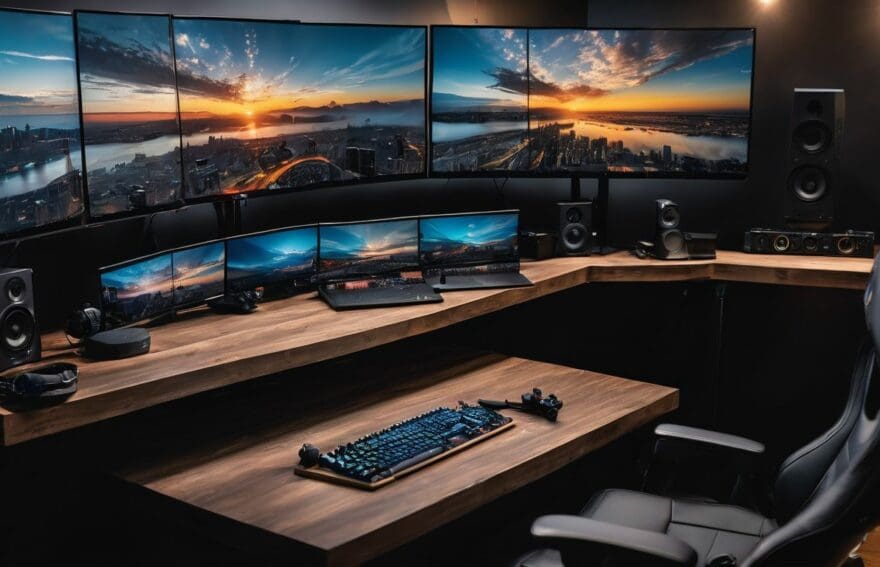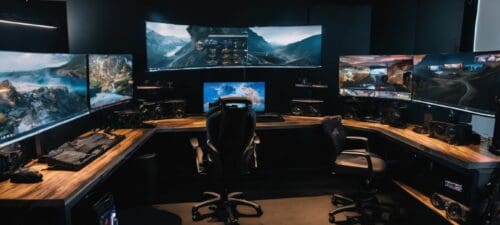From Passion to Profession: Making a Career in Esports

Updated On: February 28, 2024 by Aaron Connolly
Many of us harbour the dream of turning our cherished pastimes into a viable career, particularly within the exhilarating realm of esports. We’re familiar with this quandary ourselves; it resonates deeply, considering how swiftly esports has evolved from a specialised interest to a global sensation.
Our guide is designed to offer practical steps that will help you navigate the journey from being an avid gamer to becoming an accomplished esports professional, replete with insights and hands-on advice.
So let’s delve into how your fervour for gaming can evolve into more than just enjoyment – it could very well become your livelihood.
Key Takeaways
- Esports offers a variety of roles beyond professional gaming, including game design, team management, content creation, and event organising.
- Success in esports requires identifying your niche, building relevant skills, creating a strong portfolio and networking within the industry.
- Continuous learning and adapting to new trends are essential to remain competitive in the rapidly evolving world of esports.
- Various careers such as an Esports Team Analyst or an Esports Product Manager demand both specialised knowledge and general skills like critical thinking and effective communication.
- Building a personal brand and staying persistent can pave the way for opportunities in this fast-growing field.
The Diversity of Esports Careers
Having delved into the vibrant world of esports, let’s explore the vast array of careers it offers. Esports isn’t just about being a professional gamer; there’s a whole ecosystem supporting this dynamic industry.
You can find roles in game design and development, where creativity meets technology to craft the thrilling experiences at the heart of competitive gaming. These professionals are integral to keeping games fresh and engaging for players around the globe.
Not everyone will make it as top-tier competition stars, yet that doesn’t mean your dream ends there. Esports careers extend far beyond gameplay – consider content creation where you can share insights, entertain audiences or inform readers through articles and videos about all things gaming.
There are strategic roles too, like team managers who ensure everything runs smoothly off-screen or marketing specialists driving buzz around events and products. With our collective dedication to gaming passion, forging a full-time career in this booming sector is more accessible than ever before – opening doors for those eager to turn their hobby into a profession in various facets of esports.
Steps to Turn Your Passion into a Profession
First, find your niche in the esports industry and focus on building your skills in that area. Then, create a portfolio showcasing your work and start networking with professionals in the field.
Finally, keep learning and adapting to stay competitive in this rapidly evolving industry.
Find your niche
Identifying your niche in the esports industry is crucial. Whether it’s professional gaming, event organising, content creation, or marketing, understanding your strengths and interests will help you carve out a successful career path.
By focusing on a specific area within the gaming industry, you can tailor your skills and expertise to excel in that particular field. For instance, if you have a knack for strategy games or first-person shooters, pursuing a career as a professional gamer might be ideal for you.
On the other hand, if you enjoy behind-the-scenes work and have organisational skills, event organising could be your niche.
Build your skills
To build a successful career in esports, it is imperative to focus on honing your skills within your chosen niche. Acquiring expertise in specific games and genres will set you apart as a professional gamer or content creator.
Developing proficiency in game design or event management can open doors to diverse roles within the industry. Engaging in continuous learning and practice is vital for staying competitive and relevant.
Moreover, cultivating adaptability, quick decision-making, and strategic thinking are crucial attributes for succeeding in the fast-paced world of esports. Sharpening these skills ensures that you are well-prepared to navigate the dynamic landscape of professional gaming and take advantage of emerging opportunities.
Create your portfolio
To showcase your expertise and skills in the esports industry, the next step after building your skills is to create a portfolio that highlights your achievements and capabilities.
Detail your gaming accomplishments, certifications, tournament wins, and any other relevant experience. Additionally, include examples of projects you have worked on or created within the gaming industry to demonstrate your expertise further.
Remember to tailor your portfolio to reflect the specific career path you are pursuing within the esports industry.
Furthermore, consider creating a personal website or using online platforms like LinkedIn or Behance to showcase your portfolio. Utilise these platforms to share articles you’ve written about gaming trends or strategies you’ve developed as an esports coach.
Network and apply
To break into the esports industry, it’s crucial to network and actively seek out opportunities. Connect with other gamers, content creators, and industry professionals through social media platforms, gaming forums, and local events.
Engaging with others in the community can open doors for collaborations, sponsorships, or job offers within the gaming industry.
Applying for internships, freelance work, or entry-level positions at esports companies could provide valuable experience and a foot in the door. Keeping an eye on job listings from reputable sources within the industry while fine-tuning your portfolio can increase your chances of landing a career in esports.
Keep learning and adapting
To succeed in the dynamic world of esports, it’s crucial to keep learning and adapting. The industry evolves rapidly, with new games, technologies, and trends constantly emerging. By staying informed about the latest developments and honing your skills through continual learning, you can remain competitive in this fast-paced environment.
Embracing a growth mindset will allow you to adapt to changes and seize new opportunities as they arise.
In addition to keeping up with industry trends, continuous learning also involves seeking out feedback from peers and mentors, attending workshops and conferences, and refining your expertise in specific areas of interest within the esports landscape.
Popular Esports Careers
There are a wide range of career opportunities within the esports industry, from professional gamers and team managers to content creators and journalists. Each role requires different skills and offers unique experiences for those looking to turn their passion for gaming into a full-time profession.
Professional Gamer
Becoming a professional gamer requires dedication and talent. Gamers need to hone their skills through hours of practice, develop strategic thinking, quick reflexes, and an in-depth understanding of the game they choose to specialise in.
Successful professional gamers often participate in competitions at both local and international levels, showcasing their abilities while also growing their fan base. This career path demands perseverance and resilience as setbacks are inevitable; however, with persistence comes the potential for lucrative sponsorships, prize money, and opportunities to become a household name within the gaming community.
In today’s competitive esports landscape, aspiring professional gamers should be aware that achieving success takes time and relentless effort. With strong determination and commitment, individuals can leverage this burgeoning industry’s growth to transform their passion for gaming into a rewarding profession.
Esports Team Manager
Transitioning from the world of professional gaming to a different yet equally exhilarating role within the esports industry, an Esports Team Manager plays a crucial part in guiding and steering their team towards success.
These individuals are responsible for coordinating training sessions, organising competition schedules, managing player contracts, and ensuring overall team well-being. A keen understanding of game strategies, strong leadership skills, and effective communication abilities are essential attributes for excelling in this role.
Additionally, developing extensive knowledge about the business side of esports is vital to manage sponsorship deals and secure financial support for the team.
While overseeing player performance and mentoring them to reach their full potential are key responsibilities, it’s also imperative to create a supportive environment that fosters teamwork and personal growth.
The role demands dedication along with adaptability to stay ahead in this rapidly evolving industry – traits shared by successful gamers but applied differently within management roles.
Esports Event Organiser
Esports event organisers play a pivotal role in the industry by planning, coordinating, and executing gaming tournaments and events. They oversee all aspects of an event, from venue selection and logistics to managing sponsorships and marketing efforts.
The role requires strong organisational skills, attention to detail, and the ability to work under pressure to ensure that events run smoothly. Esports event organisers also collaborate with various stakeholders such as players, teams, sponsors, and broadcasters to deliver memorable experiences for both participants and spectators.
As part of the esports industry’s rapid growth, demand for skilled event organisers continues to rise. This presents ample opportunities for individuals looking to carve out a career in this exciting field.
Developing expertise in event management while staying abreast of industry trends will be key in making significant strides as an esports event organiser.
Esports Content Creator
As an esports content creator, you can develop and share engaging video game-related content across various digital platforms. You will need to create informative and entertaining videos, live streams, or written articles about gaming news, tips, reviews, and tutorials.
Building a loyal fan base requires consistency in delivering high-quality content that resonates with your audience’s interests and preferences. By staying up-to-date on industry trends and understanding your audience’s needs, you can cultivate a strong personal brand that sets you apart as a go-to source for gaming content.
In addition to creating engaging content, networking with other gamers, developers, and industry professionals is vital for expanding your reach and opportunities in the esports community.
Collaborating with influencers or participating in gaming events can help increase visibility and credibility within the industry while providing valuable experiences for career growth.
Esports Journalist
Esports journalists play a crucial role in the industry, reporting on gaming news, tournaments, and player performances. They provide detailed analysis and commentary on esports events, keeping fans informed and engaged.
Writing articles, creating video content, and conducting interviews are all part of their daily tasks to keep the audience up-to-date with the latest in the gaming world.
These professionals also contribute to shaping public perception of esports by offering insightful perspectives on players’ experiences and game developments. Their work helps to elevate the status of competitive gaming as a legitimate sport while providing valuable information for both seasoned enthusiasts and newcomers looking to dive into this exciting industry.
Esports Marketing Specialist
Esports marketing specialists play a crucial role in promoting teams, events, and products within the esports industry. They utilise their expertise to create strategic marketing campaigns that resonate with gaming audiences, driving engagement and brand awareness.
By leveraging knowledge of industry trends and consumer behaviour, they craft compelling narratives to connect brands with the gaming community.
To succeed as an esports marketing specialist, it’s vital to stay updated on the latest developments within the video game industry and understand the preferences of gamers. Building strong relationships with influencers and key stakeholders can also enhance promotional efforts and broaden reach.
Esports Coach
Transitioning from esports marketing to the world of coaching presents a unique opportunity for those looking to contribute in a different way. As an esports coach, you have the chance to mentor and guide aspiring gamers towards achieving their full potential.
By providing strategic insights, honing gameplay techniques, and fostering teamwork, you play a pivotal role in helping individuals or teams reach the top of their game.
Coaching involves analysing gameplay strategies, identifying areas of improvement, and offering constructive feedback. Additionally, it requires strong communication skills to effectively convey lessons and tactics that will enhance player performance.
Esports Broadcast Talent
Transitioning from coaching to broadcasting, the role of esports broadcast talent presents an exciting opportunity for gamers with a passion for storytelling and analysis. As an esports broadcaster, individuals have the chance to engage audiences through live commentary, providing expert analysis on gameplay strategies and team dynamics.
This career path offers a platform for passionate gamers to showcase their knowledge and charisma while contributing to the growth and entertainment of the esports community.
Esports broadcast talent has become an integral part of the industry’s success, enhancing viewers’ experience by offering insightful commentary, play-by-play narration, and post-match analysis.
Esports Team Analyst
Esports Team Analysts play a crucial role in the success of esports teams, using their analytical skills to evaluate gameplay strategies and provide valuable insights. By closely studying game statistics, player performances, and opponent tactics, analysts contribute to enhancing the team’s overall performance and competitive edge.
These professionals need a deep understanding of the game dynamics and trends, along with proficiency in data analysis tools to identify patterns and opportunities for strategic improvements.
Esports Team Analysts also collaborate with coaches and players to develop effective game plans based on their findings, making them an indispensable part of an esports team’s success.
Working as an Esports Team Analyst requires a blend of gaming expertise, critical thinking abilities, and strong communication skills. It demands a passion for continuous learning about games’ evolving strategies, thus staying current on industry trends is essential for excelling in this role.
Esports Product Manager
As an Esports Product Manager, you will play a vital role in overseeing the development and launch of new gaming products. You’ll collaborate with game developers, designers, and marketing teams to ensure that the products meet gamers’ needs and preferences.
Your responsibilities may include analysing market trends, coordinating product launches, and gathering feedback from players to continuously improve the gaming experience.
In this role, it’s crucial to stay updated on the latest gaming technologies and industry trends while also possessing strong project management skills. As a result-oriented individual, you’ll need to communicate effectively with cross-functional teams and use your analytical skills to make data-driven decisions that drive success in the competitive gaming market.
It takes dedication, strategic thinking, and a passion for gaming products to excel as an Esports Product Manager – traits that are essential for thriving in this exciting career.
Tips for Success in the Esports Industry
Remain dedicated and persistent in pursuing your esports career, as success often comes with hard work and perseverance. Stay up-to-date on industry trends to stay competitive and relevant in the fast-paced world of esports.
Develop a strong personal brand to showcase your skills and expertise, while also cultivating a network of connections within the industry for opportunities and growth. Be open to growth and change, as the esports industry is constantly evolving, so staying adaptable will be key to long-term success.
Remain dedicated and persistent
To succeed in the competitive world of esports, dedication and persistence are key. Aspiring to a career in gaming demands commitment to honing skills, refining strategies, and constantly adapting to industry trends.
Staying persistent through setbacks and failures is essential as it often takes time and effort to make your mark in the fast-paced world of professional gaming.
Building a successful career in esports might present challenges, yet remaining dedicated can lead you to fulfilling opportunities within the industry. Developing resilience while pursuing your passion for gaming sets the stage for achieving your goals.
Whether aspiring to be a professional gamer or seeking other roles within the field of esports, staying dedicated and persistent can open doors that would otherwise remain closed.
Stay up-to-date on industry trends
Remaining dedicated and persistent is crucial, yet staying up-to-date on industry trends is equally important in the fast-paced world of esports. By keeping abreast of the latest developments and advancements, one can anticipate upcoming opportunities and challenges within the gaming profession.
Remaining current with industry trends positions individuals to adapt their skills and expertise according to the evolving demands of the esports landscape. This proactive approach not only enhances career prospects but also demonstrates a deep commitment to continuous learning and growth within this dynamic field.
Industrious gamers continually monitor shifting trends in gaming technologies, tournament formats, audience preferences, branding strategies, and market dynamics. Embracing ongoing education through webinars, podcasts, discussions with industry professionals, or attending relevant events enables individuals to stay well-informed about emerging paradigms within esports careers.
Develop a strong personal brand
To succeed in the fiercely competitive world of esports, creating a strong personal brand is crucial. Building a recognisable persona can set you apart from the masses and attract opportunities in the industry.
Showcase your unique skills and personality through consistent content creation, such as streaming, social media presence, or video production. Engage with your audience authentically and consistently to cultivate a loyal following.
Crafting a distinct image and voice will not only help you stand out but also establish credibility within the esports community.
Cultivate a network of connections
After developing a strong personal brand, it is crucial to cultivate a network of connections within the esports industry. Networking with fellow gamers, industry professionals, and potential employers can provide valuable insights, opportunities for collaboration, and career advancement prospects.
Engaging with like-minded individuals through gaming communities, social media platforms, and industry events can lead to meaningful relationships that may open doors for employment or mentorship.
Attending esports tournaments or conventions provides an excellent opportunity to meet influential figures in the industry. Keeping an active presence on professional networking sites such as LinkedIn can also help in expanding your professional network within the esports community.
Be open to growth and change
In the dynamic world of esports, being open to growth and change is crucial for success. Embracing new technologies, trends, and strategies allows us to stay competitive in this fast-paced industry.
Adapting our skills and knowledge as the field evolves ensures that we remain relevant and valuable contributors to the esports community. By continuously seeking opportunities for personal and professional development, we can position ourselves at the forefront of innovation in gaming careers.
Staying open to growth and change also means being receptive to feedback from colleagues, mentors, and industry experts. This openness enables us to learn from others’ experiences, broadening our perspectives and expanding our skill sets.
Conclusion
Turning your passion for gaming into a career in esports takes dedication and persistence. Developing skills, building a strong personal brand, and staying updated with industry trends are crucial for success.
With diverse opportunities available, the thriving esports industry offers avenues for gamers to transition their hobby into a rewarding profession.
FAQs
1. Can playing video games really become a profession?
Absolutely! Playing video games can turn from a hobby to profession, especially in the world of competitive gaming known as esports.
2. What does it take to start a career in esports?
To kickstart a competitive gaming career, you’ll need dedication, skill, and an understanding of the various job opportunities within the esports industry.
3. Are there different types of jobs in professional video gaming?
Yes, there are many kinds of jobs in professional video gaming ranging from players to coaches, analysts, commentators and more – each with its own path from passion to profession.
4. How do I know if making a career in esports is right for me?
If you have both a deep passion for video games and the drive to improve your skills constantly, then pursuing a professional career in esports could be an exciting opportunity for you.
















